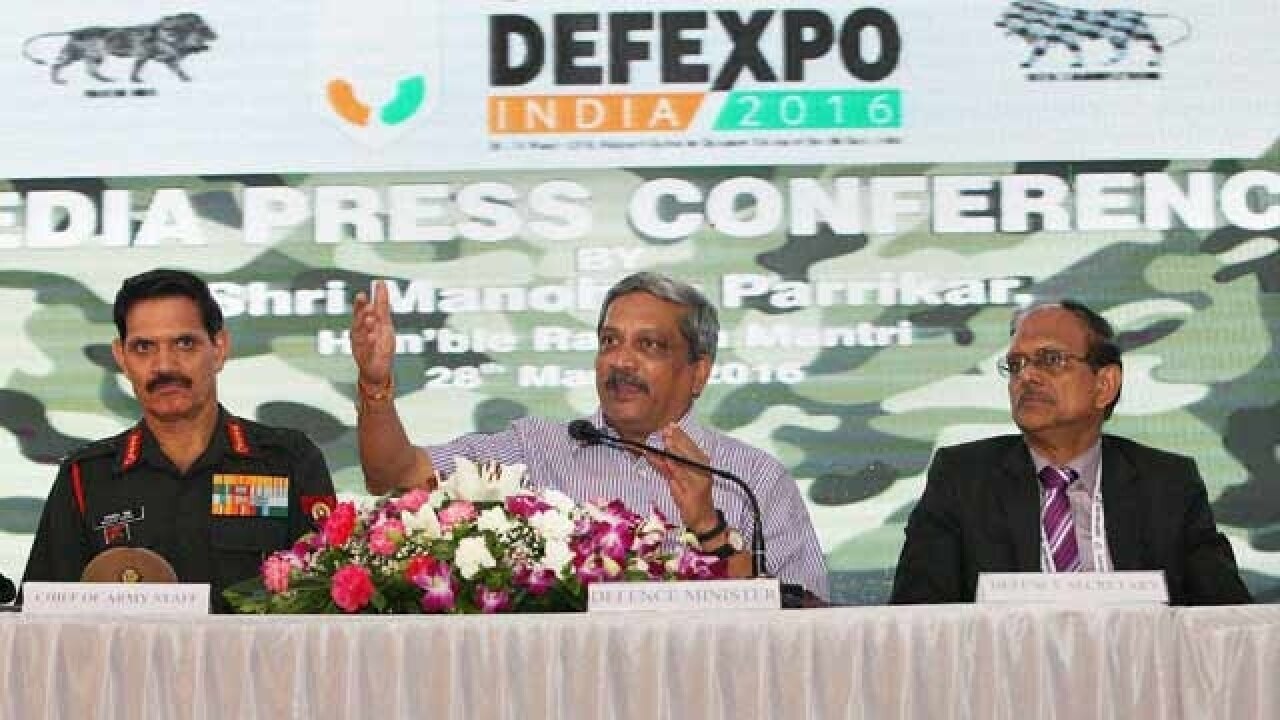
As the ninth edition of India’s biggest defence equipment fair, Defence Expo 2016, kicked off in Goa on March 28, the big ticket subject was the Defence Procurement Policy (DPP–2016) that has just been uploaded on Ministry of Defence website and becomes operational from April 2, 2016. With 1055 defence related companies and 224 delegates from 48 countries participating, the flavour of the season is the hope of an ease of doing defence business in India. The Modi government’s push for 'Make in India' is clearly stamped on the new policy. Defence Minister Manohar Parrikar used the opportunity to brand 'Make in India' and start up India initiatives. As part of the implementation of the report of the Group of Ministers on reforming the National Security System, new Defence Procurement Management Structures and Systems were set up in 2001. As a fall-out, the Defence Procurement Procedure-2002 (DPP-2002) came into effect from December 30, 2002. The DPP has since been revised in 2005, 2006, 2008, 2009, 2011 and 2013, enhancing the scope to include ‘Make,’ ‘Buy and Make (Indian)’ categories, concept of ‘Offsets’ and ship building procedure.
Defence acquisitions are not standard open market commercial procurements and have unique features such as supplier constraints, technological complexity, foreign government regulations, denial of technology, high cost and geo-political ramifications. In order to achieve enhanced self-reliance in defence manufacturing, MoD constituted a Committee of Experts to recommend suitable amendments to DPP-2013. The target was to facilitate ‘Make in India’ in defence manufacturing and also simplify/rationalise various aspects of procurement. DPP-2016 evolved as a document that covers the operational context, acquisition categories and plans under various ‘Buy’ or ‘Make’ categories, procedure for defence-ship-building and also the Fast-Track procedure. Concept of strategic-partnerships is proposed to be clearly defined.
Often defence procurements get linked to kick-backs and therefore there is a need for transparency, probity and public accountability, and a balance needs to be maintained between expeditious procurement, high quality and cost-effectiveness. Self-reliance is a major cornerstone on which the military capability of any nation rests, so it caters to the need to leverage the indigenous manpower and engineering capability. It is proposed to utilise and consolidate design and manufacturing infrastructure within the country. DPP-2016 refines ‘Make’ procedure to ensure increased participation of the Indian industry, especially MSMEs. Defence procurement involves long gestation periods. Delays in procurement impact defence preparedness and entail cost escalation. The DPP encourages quicker decision making and delegates powers to the appropriate authorities. DPP will provide public accountability and ensure level-playing field while keeping self-reliance as a key aim.
Acquisition schemes are broadly classified as, ‘Buy’, ‘Buy and Make’, and ‘Make’. ‘Buy’ is further categorised as ‘Buy (Indian indigenously designed, developed and manufactured— IDDM)’, ‘Buy (Indian)’, and ‘Buy (Global)’. ‘Buy & Make’ essentially is initial procurement of equipment in Fully Formed (FF) state followed by indigenous production through Transfer of Technology (ToT). Buy Indian or IDDM must have at least 40% indigenous content. 'Make' portion of the contract has to be minimum 50%. Authorities would approve either an appropriate ratio of FF, CKD, SKD and IM kits; or a minimum percentage indigenous content for the ‘Make’ portion. ‘Buy (Global)’ is outright purchase of equipment from foreign vendors and the Government to Government route may be adopted. Ministry of Defence will spell out 15 years Long Term Integrated Perspective Plan (LTIPP), the 5 years Services Capital Acquisition Plan (SCAP) and Annual Acquisition Plan (AAP) for clarity.
Appointment of "strategic partners" for manufacturing equipment like aircraft, warships, helicopters, submarines, tanks, etc., based on technology from foreign vendors will be a priority. The target is to kick off one or two projects under the strategic partnership model by the year-end. The separate chapter on "strategic partnerships" will require another month or two as it would require financial and Cabinet Committee on Security approvals. Defence Minister Parrikar says that DPP-2016 will break new ground. A new "penalisation provisions" policy will replace the reflexive "blacklisting" of arms vendors suspected of wrongdoing with a more appropriate range of penalties. He emphasised, however, that foreign vendors would not be allowed to get away with paying bribes. The IDDM would encourage defence industry to shift from licensed manufacture into the high-tech realm of designing and developing defence equipment. The 'Make' procedure will see the government reimbursing 90% of the development cost.There is also greater assurance for defence industry to recover its costs. After successfully developing a prototype, if the vendor does not get an order, even his 10% expenditure would be refunded. DPP-2016 liberalises the "fast track" procurement of urgently needed equipment. CII has appreciated the opening to small and medium enterprises (SMEs) to participate in the defence manufacturing and feels it will spur more design development activities within the country. FICCI fully supports the government vision to cut down the procurement cycle and install stronger and robust mechanisms to monitor probity.
DPP-2016 creates path-breaking steps for merit-driven acquisitions and will help global manufacturers and Indian companies to forge partnership. Currently, the DPSUs have their hands full for the next some years. After success in ship-building, Indian corporates are capable of pumping investments to make entry into tanks, aircrafts, helicopter, submarines etc. Many of the licensing needs have been dispensed with and export clearances are virtually online. The industry being at a nascent stage, it could have a force multiplier effect in job creation and skill development. Everyone excitedly looks forward to see if the atmosphere would become conducive for companies to enter the defence sector.